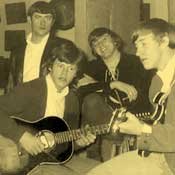Wednesday, June 23, 2010
Big Bill Broonzy—This mysterious but talented artist touched the souls of many blues fans from the 1930s through the 1950s. Often regarded as the best-selling blues artist on Vocalion's Race Records, his birthplace and birthdate are unknown, and he never could keep track of his places of residence throughout his life.
One of Broonzy's suspected birthplaces is Scott, Miss., but researchers know for certain he spent time in Pine Bluff, Ark., and headed for Chicago when he left there. He served in the U.S. Army for one year (1918-1919), and his 1924 appearance as a fiddle player with Papa Charlie Jackson introduced him to the showmanship of the blues. In December 1938, "Big Bill" played "From Spirituals to Swing" live at Carnegie Hall in New York City. The elusive bluesman died Aug. 15, 1958.
Sam Chatmon—This multi-talented musician, skilled with banjo, bass guitar, mandolin and harmonica, spent the majority of his 96-year life dedicated to his music. Born Jan. 10, 1899 in Bolton, the ninth of his father's 11 musically oriented children, Chatmon began playing the guitar when he was just 6. While he got his start as a member of one of his relative's string bands, Chatmon advanced his career by playing with his older brother Lonnie. After a couple of his brother's bandmates died, the brothers and Walter Vinson formed The Mississippi Sheiks. Throughout the latter part of Chatmon's life, he toured. One of his final performances was at the New Orleans Jazz and Heritage Festival in 1976. Rumor has it (actually Wikipedia) Chatmon and Charlie Patton were half-brothers.
Muddy Waters—Born McKinley Morganfield in Rolling Fork, Miss. (or Issaquena County depending on who you ask), Muddy Waters, as the singer/songwriter/guitarist was later called, they say, a slick-talking fellow. He first learned to play the guitar when he was 17, and he eventually moved to Chicago with the hopes of starting a music career.
Because of his quick learning and musicianship, by mid-career he was known as the "The Father of Chicago Blues," a moniker many people recognize today. Through singles like his 1948 hits "I Can't Be Satisfied" and "I Feel Like Going Home," Muddy Waters made new innovations in modern blues music through the use of his down-to-earth lyrics. While some people are familiar with these accomplishments, they're often unaware that Muddy inspired the likes of The Rolling Stones and the British blues movement of the 1960s. In fact, the artist's achievements were so significant, Rolling Stone magazine ranked him No. 17 on its "Billboard's 100 Greatest Artists" list.
The Gants—This popular 1960s garage-rock band, originally comprised of Sid Herring, Johnny Freeman (who was later replaced by Johnny Saunders), Vince Montgomery and Don Woods, were popular for their Beatles-esque style. All natives of Greenwood, Miss., the band got an early start performing as the opening act for The Animals but saw their success delayed because of their age, many assume.
The group eventually released its first single, "My Baby Don't Care," in 1965, on the Statute recording label. The group's first album, "Roadrunner," reached No. 46 on the U.S. pop-singles chart. As of 2005, The Gants had picked up their instruments again with Charles Hall replacing the late Vince Montgomery.
Previous Comments
- ID
- 158333
- Comment
"Road Runner," the Gants cover of the famous R&B tune by Ellas McDaniel (aka Bo Diddley) was actually the A side of their original single on Statue Records (605-A) in 1965. "My Baby Don't Care" was the B side (605-B). At least that's the configuration on the pressing of it I have.
- Author
- ed inman
- Date
- 2010-06-24T22:10:04-06:00

Comments
Use the comment form below to begin a discussion about this content.
Sign in to comment
Or login with:
OpenID